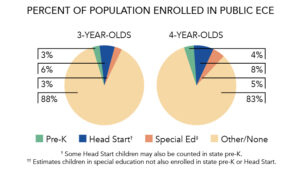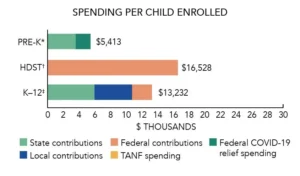Children and Family Victories this Legislative Session and in the Arizona Budget
Arizona’s Governor and a bipartisan group of legislators came together to pass the state budget, which starts on July 1. The Arizona State Legislature also ended the legislative session. Children’s Action Alliance (CAA) applauds Arizona’s investment in early childhood, education, health, and family supports, while recognizing there is still more to be done.
Early Learning
In a historic win, CAA is thrilled with three important early childhood investments that keep children, families, child care providers, and rural communities in mind. This state budget includes two out of three of CAA’s 2025 legislative early childhood priorities: increasing access to child care and making it more affordable for families.
Arizona made the largest state investment in over fifteen years, with almost $50 million in state General Funds towards addressing issues with child care:
- Expand quality options for children by supporting investments that make child care more affordable for families
- ▪ In the largest appropriation since 2009, the Child Care Assistance Program receives $44.9 million. This appropriation is expected to help at least half of the families who have been on the waitlist to access quality child care. This was CAA’s top budget priority.
- ▪ The budget also included a proposal from Governor Hobbs’ Bright Futures AZ initiatives for a $3 million appropriation to support an out-of-school grant program (youth ages 5-12) for eligible families. Thirty percent of these funds are reserved for rural communities.
- Increase the number of quality child care facilities in rural and underserved communities by investing in child care construction projects
- ▪ Rural Arizona wins with many of the child care investments included in the Arizona budget. In addition to the funds set aside for rural areas for the out-of-school grant program, $1.5 million was also approved to build a child development center in the Town of Taylor, a rural community in northern Arizona.
While these measures are a significant step, many of these investments were inadequate for what is desperately needed. The Child Care Assistance Program still needs more funding for the waitlist as thousands of families make the tough decision on how to balance work and afford child care, and to also consider provider reimbursement rates and quality enhancement initiatives.
CAA and our partners are committed to an Arizona where our families, children, child care providers, and businesses feel supported amidst the climbing costs of child care. CAA will continue prioritizing the accessibility and affordability of child care in the next legislative session.
K-12 Education
All students deserve a quality education that promotes their health and overall well-being. To do this, Arizona delivered a few needed solutions for schools with students in low-income communities and with anti-hunger initiatives. CAA applauds the investments in our public schools.
- Provide additional funding for schools
- ▪ In a much-needed win for our schools, $37 million was appropriated to reinstate the opportunity weight, along with additional assistance to districts in the amount of $29 million. This additional funding recognizes that students living in low-income communities with systemic barriers have greater opportunity to succeed academically with additional support.
- ▪ Although Prop 123 was not renewed, Arizona is required to backfill the amount that was originally generated from the state land trust to public schools. This amount includes almost $300 million in General Fund dollars.
- ▪ The budget addressed the Aggregate Expenditure Limit for two years, allowing school districts to allocate their approved budgets.
- Prevent child hunger through school meals
- ▪ The $3.8 million amount that was included in the HB2213 appropriation for free school meals is essential to ensure that copays for school meals are not an obstacle for eligible children. This measure had overwhelming bipartisan support and was a CAA budget priority sent to the Governor and legislators.
Investment in K-12 funding has numerous positive impacts on both individuals and society. It leads to increased academic achievement and improved graduation rates, ultimately creating a more skilled and educated workforce that boosts economic growth. However, Arizona consistently ranks low in terms of K-12 funding.
Next year, the Arizona State Legislature and the Governor’s Office must find an agreement to renew Prop 123 for funding for Arizona’s schools. Arizona cannot afford to continue backfilling the amount with limited General Fund dollars. Our children and public schools deserve more.
Health Care and Nutrition
Protecting AHCCCS, Arizona’s Medicaid Program, and food assistance through the Supplemental Nutrition Assistance Program (SNAP) at both the state and federal level, are top CAA’s priorities. Governor Hobbs and the bipartisan group of legislators preserved strong health and nutrition services for our children and families.
- At the state level, Arizona saw harmful proposals that would have restricted food choices for families who participate in SNAP, which was prevented with a veto by Governor Hobbs of HB2165.
- There were bills proposing to cut over $100 million from AHCCCS (SB1470) and adding wasteful administrative hurdles (HB2926, HB2449, HB2953). These bills were stopped in the Legislature (HB2926 and HB2953) or by a veto (HB2449).
- ▪ The proposed reductions in AHCCCS funding would have caused many Arizonans to lose their health care. They also risked destabilizing Arizona’s health care system and causing a significant cost shift to Arizonans, local employers, and small businesses.
Protecting AHCCCS and SNAP at the state level was especially critical as we continue to face serious threats to the future of Medicaid and SNAP at the federal level. The state budget also made positive health investments in Arizona, specifically our workforce, parent caregivers, and rural communities.
- Protect families
- ▪ The Division of Developmental Disabilities (DDD) provides critical services for children and adults in need of specialized care. Arizona expanded a program to allow parents to be caregivers, which provides needed support for families. DDD required an additional $122 million for costs in the current budget, which was funded after a lengthy battle. This is critically important funding for Arizona’s families.
- Expand school-based health services in rural Arizona
- ▪ Health care services delivered in schools are an opportunity to meet children where they are, in a setting where they spend most of their time. School-based health services are especially important in low-income and rural communities where access to health care services is limited or difficult to access. CAA appreciates the $2.5 million investment in the Rural Arizona School Nurse Access Program, which aims to increase the number of school nurses in rural and underserved areas of our state.
CAA continues to fight major cuts to AHCCCS and SNAP at the federal level, which risks stripping many Arizonans of their health care coverage and food security, as well as destabilizing the health care system in Arizona. We look forward to continuing our efforts to protect and expand health care in Arizona, including for oral health and maternity care, next year.
Family Well-Being and Supports
When families have access to concrete supports like Temporary Assistance for Needy Families (TANF), child care, and stable housing, reports of neglect and entries into the foster care system decrease. When a child’s safety is at risk, it is critical to equip grandparents, aunts, uncles, and other kinship caregivers to step in without facing financial hardship.
- Invest in youth transitioning out of care
- ▪ The FY26 state budget includes $6.4 million in ongoing funding for Extended Foster Care services, promoting stable housing, education, and workforce opportunities that help young people successfully transition to adulthood. It also empowers foster youth by requiring DCS to "identify and consider" the placement preferences of the child in developing a plan for their placement.
CAA championed several legislative proposals this session aimed at strengthening family stability and expanding support for kinship caregivers. While SB1305 stalled, the bill sought to increase financial assistance to kinship caregivers outside the Department of Child Safety (DCS) system, and another proposal, SB1490, sought to raise stipends for kinship foster families, recognizing the essential role relatives play in providing stability for children in care.
We also supported SB1246 and HB2462, bills which updated the definition of neglect to ensure that poverty alone is not treated as a reason to separate children from their families. Although these proposals did not pass, we remain committed to advancing these measures next session.
The Legislature passed SB1333, which strengthens oversight of congregate care placements and reinforces efforts to place children in family-like settings whenever possible. The bill ensures children with behavioral needs are not turned away from care when appropriate services are available, supporting more timely and appropriate placements for youth with behavioral health challenges.
Summary
CAA is grateful to Governor Katie Hobbs, the Arizona State Legislature, advocates, and partner organizations for their commitment to passing needed solutions this legislative session. While many of these measures were a step in the right direction, more investment in our children and families is needed. Looking forward, CAA will continue to work for bipartisan solutions, while protecting services and programs for children and families.


